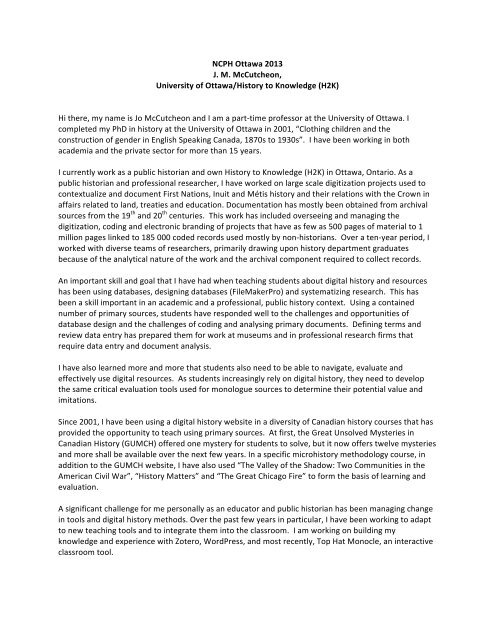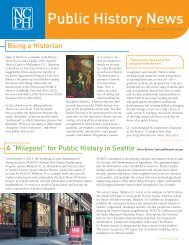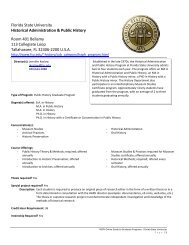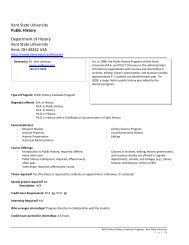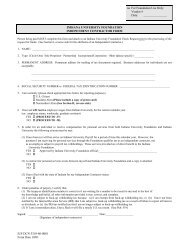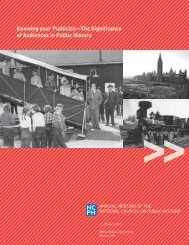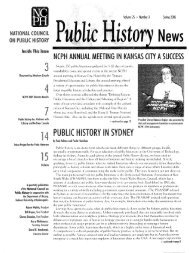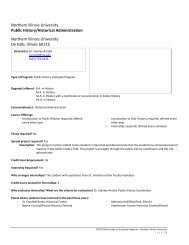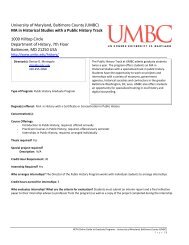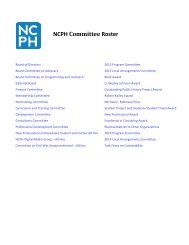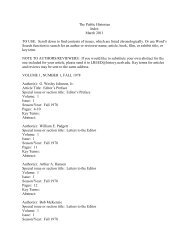Case Statement - National Council on Public History
Case Statement - National Council on Public History
Case Statement - National Council on Public History
You also want an ePaper? Increase the reach of your titles
YUMPU automatically turns print PDFs into web optimized ePapers that Google loves.
NCPH Ottawa 2013 <br />
J. M. McCutche<strong>on</strong>, <br />
University of Ottawa/<strong>History</strong> to Knowledge (H2K) <br />
Hi there, my name is Jo McCutche<strong>on</strong> and I am a part-‐time professor at the University of Ottawa. I <br />
completed my PhD in history at the University of Ottawa in 2001, “Clothing children and the <br />
c<strong>on</strong>structi<strong>on</strong> of gender in English Speaking Canada, 1870s to 1930s”. I have been working in both <br />
academia and the private sector for more than 15 years. <br />
I currently work as a public historian and own <strong>History</strong> to Knowledge (H2K) in Ottawa, Ontario. As a <br />
public historian and professi<strong>on</strong>al researcher, I have worked <strong>on</strong> large scale digitizati<strong>on</strong> projects used to <br />
c<strong>on</strong>textualize and document First Nati<strong>on</strong>s, Inuit and Métis history and their relati<strong>on</strong>s with the Crown in <br />
affairs related to land, treaties and educati<strong>on</strong>. Documentati<strong>on</strong> has mostly been obtained from archival <br />
sources from the 19 th and 20 th centuries. This work has included overseeing and managing the <br />
digitizati<strong>on</strong>, coding and electr<strong>on</strong>ic branding of projects that have as few as 500 pages of material to 1 <br />
milli<strong>on</strong> pages linked to 185 000 coded records used mostly by n<strong>on</strong>-‐historians. Over a ten-‐year period, I <br />
worked with diverse teams of researchers, primarily drawing up<strong>on</strong> history department graduates <br />
because of the analytical nature of the work and the archival comp<strong>on</strong>ent required to collect records. <br />
An important skill and goal that I have had when teaching students about digital history and resources <br />
has been using databases, designing databases (FileMakerPro) and systematizing research. This has <br />
been a skill important in an academic and a professi<strong>on</strong>al, public history c<strong>on</strong>text. Using a c<strong>on</strong>tained <br />
number of primary sources, students have resp<strong>on</strong>ded well to the challenges and opportunities of <br />
database design and the challenges of coding and analysing primary documents. Defining terms and <br />
review data entry has prepared them for work at museums and in professi<strong>on</strong>al research firms that <br />
require data entry and document analysis. <br />
I have also learned more and more that students also need to be able to navigate, evaluate and <br />
effectively use digital resources. As students increasingly rely <strong>on</strong> digital history, they need to develop <br />
the same critical evaluati<strong>on</strong> tools used for m<strong>on</strong>ologue sources to determine their potential value and <br />
imitati<strong>on</strong>s. <br />
Since 2001, I have been using a digital history website in a diversity of Canadian history courses that has <br />
provided the opportunity to teach using primary sources. At first, the Great Unsolved Mysteries in <br />
Canadian <strong>History</strong> (GUMCH) offered <strong>on</strong>e mystery for students to solve, but it now offers twelve mysteries <br />
and more shall be available over the next few years. In a specific microhistory methodology course, in <br />
additi<strong>on</strong> to the GUMCH website, I have also used “The Valley of the Shadow: Two Communities in the <br />
American Civil War”, “<strong>History</strong> Matters” and “The Great Chicago Fire” to form the basis of learning and <br />
evaluati<strong>on</strong>. <br />
A significant challenge for me pers<strong>on</strong>ally as an educator and public historian has been managing change <br />
in tools and digital history methods. Over the past few years in particular, I have been working to adapt <br />
to new teaching tools and to integrate them into the classroom. I am working <strong>on</strong> building my <br />
knowledge and experience with Zotero, WordPress, and most recently, Top Hat M<strong>on</strong>ocle, an interactive <br />
classroom tool.


